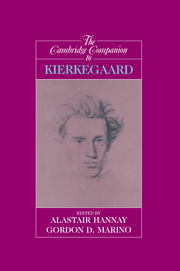Book contents
- Frontmatter
- Introduction
- 1 Out with It!
- 2 The unknown Kierkegaard
- 3 Art in an age of reflection
- 4 Kierkegaard and Hegel
- 5 Neither either nor or
- 6 Realism and antirealism in Kierkegaard's Concluding Unscientific Postscript
- 7 Existence, emotion, and virtue
- 8 Faith and the Kierkegaardian leap
- 9 Arminian edification
- 10 “Developing” Fear and Trembling
- 11 Repetition
- 12 Anxiety in The Concept of Anxiety
- 13 Kierkegaard and the variety of despair
- 14 Kierkegaard's Christian ethics
- 15 Religious dialectics and Christology
- 16 The utilitarian self and the "useless" passion of faith
- Bibliography
- Index
6 - Realism and antirealism in Kierkegaard's Concluding Unscientific Postscript
Published online by Cambridge University Press: 28 May 2006
- Frontmatter
- Introduction
- 1 Out with It!
- 2 The unknown Kierkegaard
- 3 Art in an age of reflection
- 4 Kierkegaard and Hegel
- 5 Neither either nor or
- 6 Realism and antirealism in Kierkegaard's Concluding Unscientific Postscript
- 7 Existence, emotion, and virtue
- 8 Faith and the Kierkegaardian leap
- 9 Arminian edification
- 10 “Developing” Fear and Trembling
- 11 Repetition
- 12 Anxiety in The Concept of Anxiety
- 13 Kierkegaard and the variety of despair
- 14 Kierkegaard's Christian ethics
- 15 Religious dialectics and Christology
- 16 The utilitarian self and the "useless" passion of faith
- Bibliography
- Index
Summary
If a reader should go into a good library and browse through the books about Kierkegaard, she would, I think, be struck immediately by a significant difference between most of the older books and quite a few, though certainly not all, of the more recent volumes. Older books, such as James Collins's The Mind of Kierkegaard, tended to see Kierkegaard primarily as a philosopher, albeit an unusual one with poetic gifts and religious interests. By and large, they approached Kierkegaard as one would approach other philosophers, inquiring as to his views on ethics, epistemology, and other standard philosophical issues. The underlying assumption is that Kierkegaard had convictions about such issues, and that those convictions might be, in part or as a whole, true or false, correct or incorrect.
Roger Poole's Kierkegaard: The Indirect Communication may serve as a good example of the type of later book I have in mind, though works by such authors as Louis Mackey, Sylviane Agacinski, John Vignaux Smythe, and John D. Caputo would serve equally well. Poole explicitly distances himself from the tradition, one that he stigmatizes as “theological,” that understands Kierkegaard's pseudonymous works as containing philosophical doctrines. On his view, “Kierkegaard writes text after text whose aim is not to state a truth, not to clarify an issue, not to propose a definite doctrine, not to offer some meaning that could be directly appropriated.” Kierkegaard cannot offer us objective truth because he is seen as committed to a view of language and meaning similar to that of Derrida and Lacan. In order for propositions to have fixed truth values, they must be about something, and Kierkegaard's texts do not refer in this way.
- Type
- Chapter
- Information
- The Cambridge Companion to Kierkegaard , pp. 154 - 176Publisher: Cambridge University PressPrint publication year: 1997
- 1
- Cited by



